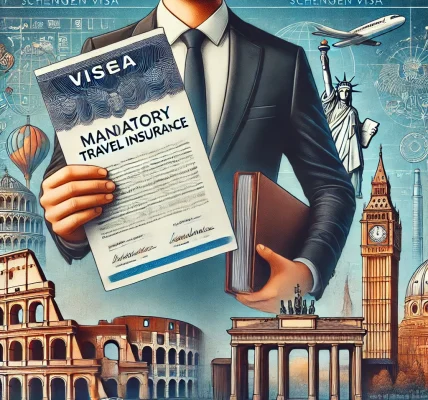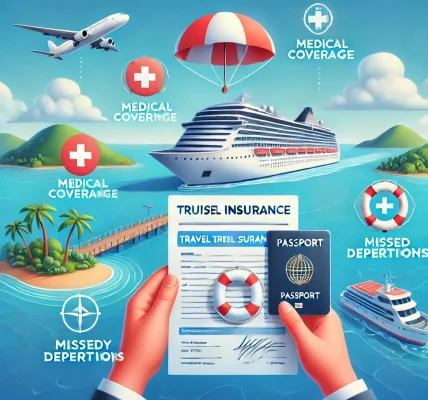Introduction
When planning a one-way trip, many travelers overlook one-way travel insurance, assuming that standard travel insurance policies will cover them. However, regular travel insurance often requires a return ticket and may not provide adequate protection for one-way travelers.
Whether you’re relocating, studying abroad, taking an extended work assignment, or simply embarking on an indefinite journey, one-way travel insurance ensures you stay covered against unexpected events like medical emergencies, trip interruptions, and lost baggage.
In this guide, we’ll explain who needs one-way travel insurance, why it’s essential, what it covers, and how to choose the best plan.
What is One-Way Travel Insurance?
One-way travel insurance is a specialized policy designed for travelers who do not have a return ticket or a planned return date. It covers unforeseen events that may occur during your journey, including:
- Emergency medical expenses
- Trip cancellations and delays
- Lost or delayed baggage
- Personal liability
- Accidental death and repatriation
Unlike standard travel insurance, one-way policies do not require proof of a round-trip ticket and may provide extended coverage until you settle in your destination country or arrange long-term insurance.
Who Needs One-Way Travel Insurance?
1. Expats and Relocating Individuals
If you’re moving abroad for work or a new lifestyle, one-way travel insurance protects you until you secure health insurance in your new country.
2. International Students
Many students traveling abroad for long-term studies need temporary coverage before they enroll in a local health insurance plan.
3. Digital Nomads and Long-Term Travelers
Those who travel indefinitely without a set return date can benefit from flexible coverage that protects them as they move between countries.
4. Temporary Workers and Contractors
Freelancers, remote workers, or contract employees working in another country need insurance before getting employer-provided coverage.
5. Retirees Moving Abroad
Many retirees who relocate to another country need coverage until they qualify for local healthcare benefits.
6. Individuals on One-Way Cruises or One-Way Flights
If you’re taking a one-way cruise or flight and don’t have a return ticket, you may need specialized travel insurance that covers you in multiple destinations.
Why One-Way Travel Insurance is Essential
1. Medical Emergencies Can Be Expensive
If you fall ill or get injured while traveling, medical expenses can be extremely high. Many countries refuse treatment without upfront payment, and emergency medical evacuation can cost thousands of dollars.
📌 Example: A traveler moving to Australia suffered a medical emergency in transit. Without one-way travel insurance, they had to pay for hospitalization out of pocket.
2. Airlines Can Lose Your Luggage
One-way travelers often carry valuable belongings, including electronics, work equipment, or important documents. If your luggage is lost, stolen, or delayed, insurance can compensate for replacement costs.
📌 Example: A digital nomad flying to Asia lost their checked-in baggage. One-way travel insurance reimbursed them for essentials until their luggage was recovered.
3. Trip Delays and Cancellations Happen
If your flight is delayed, missed, or canceled, travel insurance covers accommodation, meals, and new travel arrangements.
📌 Example: A student flying to Canada had their flight canceled due to bad weather. Their insurance covered hotel expenses and a new flight.
4. Legal Protection is Important
Accidental damage or legal disputes in a foreign country can be costly. One-way travel insurance often includes personal liability coverage for legal expenses if you unintentionally harm someone or damage property.
📌 Example: A freelancer in Europe accidentally damaged a rented apartment. Their insurance covered repair costs, avoiding legal trouble.
5. Repatriation and Emergency Evacuation Are Critical
If you experience a medical emergency or an unexpected death, repatriation ensures your return home or to a medical facility.
📌 Example: A retiree in Thailand needed emergency evacuation due to a stroke. Their insurance covered medical transport to their home country.
What Does One-Way Travel Insurance Cover?
✅ Emergency Medical Expenses – Covers hospital bills, doctor visits, and medication costs. ✅ Trip Cancellations & Delays – Refunds pre-paid travel expenses due to valid cancellations. ✅ Lost, Stolen, or Delayed Baggage – Compensation for essentials if luggage is lost or delayed. ✅ Accidental Death & Repatriation – Covers transportation in case of death or medical emergencies. ✅ Personal Liability – Covers costs if you accidentally injure someone or damage property. ✅ Travel Assistance Services – 24/7 helpline for medical, legal, and emergency support.
🚨 What It May Not Cover:
- Pre-existing medical conditions (unless specifically included).
- High-risk activities (adventure sports, extreme travel).
- War zones or travel to restricted areas.
- Losses due to reckless behavior or intoxication.
How to Choose the Right One-Way Travel Insurance Plan
1. Check Coverage Duration
- Some policies end after a certain number of days (e.g., 30, 60, or 90 days).
- Others provide long-term coverage until you buy local insurance.
2. Compare Medical Coverage Limits
- Choose a policy with at least $100,000 in medical coverage.
- Check if emergency medical evacuation is included.
3. Look for Baggage & Trip Protection
- Ensure baggage loss/delay coverage matches the value of your belongings.
- Check trip cancellation policies for valid reimbursement conditions.
4. Review Exclusions & Fine Print
- Make sure adventure sports, pandemics, and pre-existing conditions are covered if needed.
- Confirm that your policy is valid in all transit and destination countries.
5. Choose an Insurer with 24/7 Support
- Look for insurers with global customer service and emergency assistance.
How to Buy One-Way Travel Insurance
- Research & Compare Plans Online – Use comparison websites to find the best policy.
- Declare Pre-Existing Conditions – Disclose medical history to avoid claim rejection.
- Read Policy Terms & Conditions – Ensure it covers all necessary risks.
- Purchase Before Departure – Most policies must be bought before you start your trip.
Conclusion
One-way travel insurance is essential for anyone traveling without a return ticket. Whether you’re moving abroad, studying, or working overseas, this specialized insurance protects you against medical emergencies, trip disruptions, lost luggage, and legal issues.
Before embarking on your journey, compare different policies, understand the coverage details, and choose a plan that best suits your travel needs.



